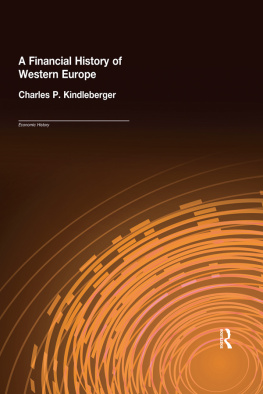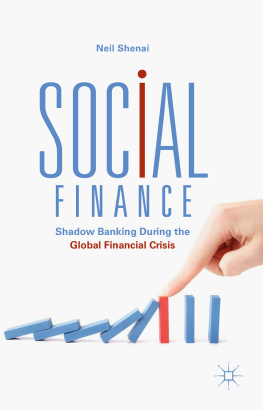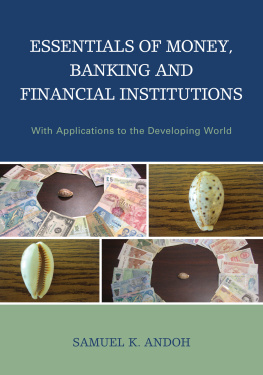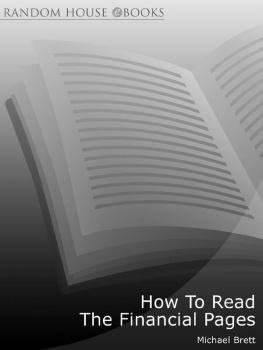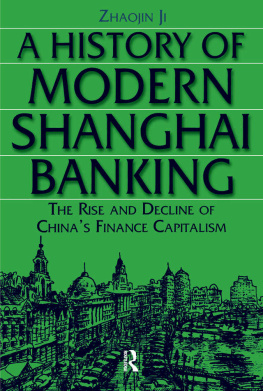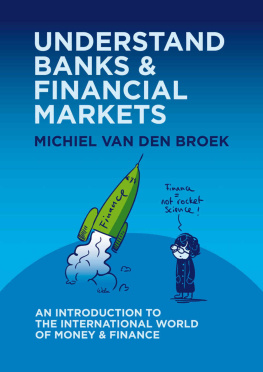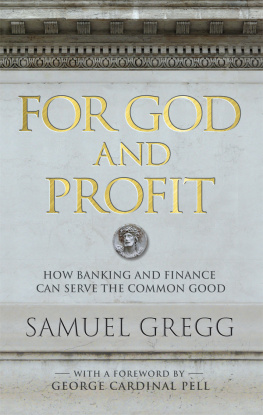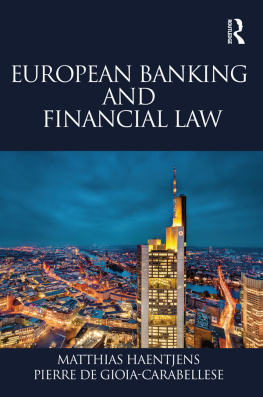ECONOMIC HISTORY
A FINANCIAL HISTORY OF
WESTERN EUROPE
FINANCE, MONEY AND BANKING
A FINANCIAL HISTORY OF
WESTERN EUROPE
CHARLES P. KINDLEBERGER

First published 1984
Reprinted in 2006 by
Routledge
2 Park Square, Milton Park, Abingdon, Oxon OX14 4RN
Routledge is an imprint of Taylor & Francis Group
Transferred to Digital Print 2010
1984 Charles P. Kindleberger
All rights reserved. No part of this book may be reprinted or reproduced or utilized in any form or by any electronic, mechanical, or other means, now known or hereafter invented, including photocopying and recording, or in any information storage or retrieval system, without permission in writing from the publishers.
The publishers have made every effort to contact authors and copyright holders of the works reprinted in the Economic History series. This has not been possible in every case, however, and we would welcome correspondence from those individuals or organisations we have been unable to trace.
These reprints are taken from original copies of each book. In many cases the condition of these originals is not perfect. The publisher has gone to great lengths to ensure the quality of these reprints, but wishes to point out that certain characteristics of the original copies will, of necessity, be apparent in reprints thereof.
British Library Cataloguing in Publication Data
A CIP catalogue record for this book
is available from the British Library
A Financial History of Western Europe
ISBN 0-415-37867-2 (volume)
ISBN 0-415-37850-8 (subset)
ISBN 0-415-28619-0 (set)
Routledge Library Editions: Economic History
A Financial History of Western Europe
By the same author
International Short-Term Capital Movements (1937)
The Dollar Shortage (1950)
International Economics (1953)
The Terms of Trade: A European Case Study (1956)
Economic Development (1958)
Foreign Trade and the National Economy (1962)
Economic Growth in France and Britain, 18511950 (1964)
Europe and the Dollar (1966)
Europes Post-war Growth: The Role of the Labor Supply (1967)
American Business Abroad: Six Lectures on Direct Investment (1969)
Power and Money: The Politics of International Economics and the Economics of International Politics (1970)
The World in Depression, 19291939 (1973)
Economic Response: Comparative Studies in Trade, Finance and Growth (1978)
Manias, Panics and Crashes: A History of Financial Crises (1978)
International Money: A Collection of Essays (1981)
Economic Laws and Economic History: The 1980 Mattioli Lectures (forthcoming)
A Financial History of
Western Europe
CHARLES P. KINDLEBERGER
Ford International Professor of Economics, Emeritus
Massachusetts Institute of Technology
London
GEORGE ALLEN & UNWIN
Boston Sydney
Charles P. Kindleberger, 1984.
This book is copyright under the Berne Convention. No reproduction without permission. All rights reserved.
George Allen & Unwin (Publishers) Ltd,
40 Museum Street, London WC1A 1LU, UK
George Allen & Unwin (Publishers) Ltd,
Park Lane, Hemel Hempstead, Herts HP2 4TE, UK
Allen & Unwin, Inc.,
9 Winchester Terrace, Winchester, Mass. 01890, USA
George Allen & Unwin Australia Pty Ltd,
8 Napier Street, North Sydney, NSW 2060, Australia
First published in 1984
First published in this format 1985
British Library Cataloguing in Publication Data
Kindleberger, Charles P.
A financial history of Western Europe. 1.
Finance Europe, Western History
I. Title
332 .094 HG 186
ISBN 0-04-332088-0 cased
0-04-332105-4 paperback
Library of Congress Cataloging in Publication Data applied for
To S.M.K.
Once more, after forty-five years, with feeling.
Contents
Cartoons
Maps
Figures
An obvious criticism of this book is that it relies almost entirely on secondary sources. But this, I think, is inevitable with any work of synthesis having a wide scope; and such works are surely of value, not only to the general reader but also to the scholar who, working on original sources, while investigating in detail a narrow field, is always in danger of seeing no further than the hedges around his own field. (D. P. Walker in the New York Review of Books, 29 October 1979, reviewing Elizabeth I. Eisenstein, The Printing Press as an Agent of Change)
When a widower friend of ours married another friend, a widow, my wife said, Goody: I love to use up leftovers. So do I, and this book is the writing out of lecture notes of a course given first at the University of Texas at Austin in the spring of 1979, and again at MIT in the fall of 1980. If I were to pursue the rather disagreeable metaphor, I might add that most of the ingredients come from the store, rather than being home-made.
Some years ago I reviewed a book with a broad overview of economic history and concluded that the author was superficial on everything I knew well but very good on what I did not. This finally struck me as a compliment, and I hope to do as well.
The organization of the book will confuse some, irritate others, but represents a somewhat arbitrary choice among the inevitable compromises between a functional and a chronological arrangement. More than half of the bookfifteen out of twenty-four chaptersis devoted to roughly four centuries to 1914, and the last half to the seventy years since then. The first section is divided into parts dealing with Money, Banking, and Finance, with the last consisting in an omnium gatherum for governmental and private finance, together with foreign lending and a chapter on national and international financial crises, sandwiched in more or less arbitrarily. The rest of the book consists of two parts. Part Four deals with the interwar period from 1914 to 1939, again organized partly as a functional discussion of the problems of various European currencies as they recovered from the financial strain of war, and partly chronologically. Part Five brings the story down almost to the present with wartime and postwar financial reconstruction after World War II and a chapter on the unfinished process of European financial integration.
The book is not statistical for two reasons: it is not my style, and statistics do not on most aspects of the subject go back far.
While there is some danger to them of implicating people in this work, I have taken advantage of my position as teacher to extend my reach through term papers of students not only in the courses mentioned but also in earlier courses on European economic history generally. I may omit some names because I have not always taken full notes, but the record shows that I have been helped by Stuart Glosser, William Pierson, Joseph Ricciardi and Ross van Wassenhove at the University of Texas, and by Dean Amel, Scott Bales, Axel Brsch-Supan, Riccardo Faini, David Johnson, Stephen Kanner, Arnold Kling, Adam Lerrick, Stephen Lewis, Alan Marcus, Robert Mac-Cauley, Ian McKenzie, Angelo Melino, Anthony Pappas, Matthew Shapiro, Martin Ramsler, Christophe Riboud, John Rust, George Thaler, Jean Tirole and Jos Vinals-Iniquez in my MIT classes, some students attending from Harvard. At a somewhat more senior level, I have benefited from communications in the form of reprints, elusive references, answers to specific questions and the like from Knut Bor-chardt, Jean Bouvier, Michel Brugire, Gordon Craig, Scott Eddie, Gershon Feder, David Good, Raymond Goldsmith, Earl J. Hamilton, David Lewis, Maurice Lvy-Leboyer, Bernard Malamud, Larry Neal, Sidney Pollard, Barry Supple, Herman Van der Wee, Karen Vaughn and H. R. C. Wright. Peter Bernholz and I had a series of useful discussions. Edward Shaw and Walter J. Levy read Chapters 5 and 7 respectively. Peter Bernstein, Carlos Diaz-Alejandro and Peter Temin read a number of chapters and offered useful comments. My greatest debts, however, are to Rondo Cameron and Philip Cottrell who went through the entire work with great care and wide knowledge and gave me the benefit of their detailed and frank criticism. Since I did not always accept their suggestions for improvement, none is to be blamed for its remaining shortcomings.
Next page
